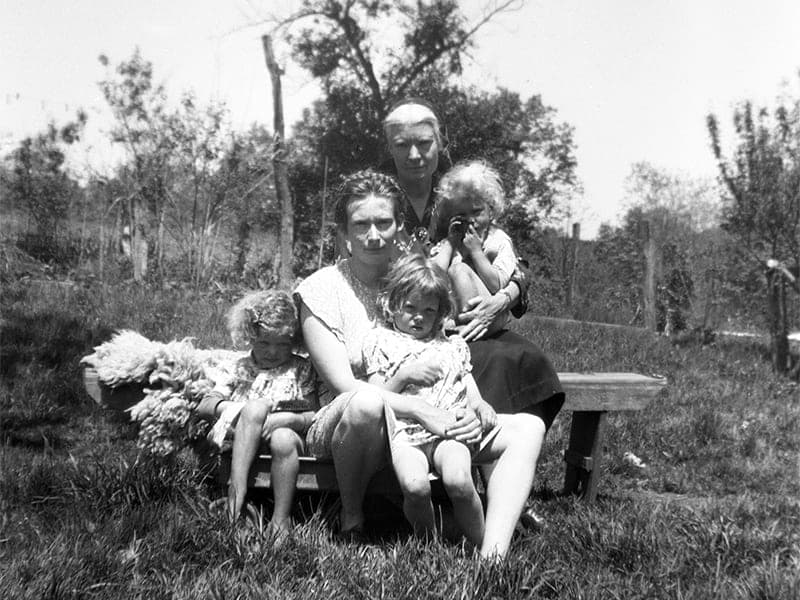One of Kate Hennessy’s favorite memories of her grandmother, Catholic social justice activist Dorothy Day, is of sitting in a bedroom at the Catholic Worker farm in Tivoli, N.Y., watching her use an old manual typewriter to answer people’s letters.
“Each letter would of course provoke a story,” Hennessy recalled. “She was a fabulous storyteller with a mesmerizing voice. I could listen to her for hours, just being raised by her voice.”
Watching her grandmother compose what would become famous columns for the Catholic Worker newspaper also impressed Hennessy, the youngest of Day’s nine grandchildren.
“She always said to everyone, ‘Keep a journal.’ So I took her advice. I started keeping a journal, probably from when I was 12 years old. It was really a lifeline for me,” Hennessy said.
Now Hennessy has culled those memories into a book about Day, a complex woman the Catholic Church is considering making a saint.
Many biographies describe Day’s social justice work and her tumultuous life both before and after founding the Catholic Worker Movement. In “Dorothy Day: The World Will Be Saved by Beauty,” Hennessy presents Day as a matriarch with a close but complicated relationship with her daughter and only child, Tamar Hennessy, as well as her nine grandchildren.
The book’s title comes from one of Day’s favorite quotes from Fyodor Dostoyevsky. Day would often add her own coda to the Dostoyevsky quote: “The world will be saved by beauty, and what is more beautiful than love?”
“When I heard this, I thought this is a prayer; it’s like sending out a prayer,” Hennessy said. “We can’t quite define what beauty is. But maybe it’s a feeling of being transported, of having some kind of change within us that makes us observe and see the world around us in a much more sacred way.”
Day, she added, had an “unerring eye that went straight to those things that I or other people would not find beautiful, and that would make us look at something more closely.”
In a review in The Christian Science Monitor, Peter Lewis wrote: “Hennessy’s biography unspools slowly, though not leisurely or even comfortably, as it is genuinely questing after personal and familial enlightenment, and tests of willpower, of facing the human weaknesses, blind errors, and hurtfulnesses of one you love.”
Hennessy recalls both her mother, who died in 2008, and grandmother, who died in 1980, as women of contradictions.
Tamar was a talented craftswoman and voracious reader who felt self-conscious about not having a college degree. She raised nine children and ran a farm in Vermont, but failed for years to separate herself from a troubled marriage with an alcoholic husband who suffered frequent bouts of depression. Her sense of self-worth often depended on what her mother thought of her.
Day, who was born in 1897, was a convert to Catholicism who dabbled in communism, had an abortion as a young woman, and never married Tamar’s father. She loved taking to the road for speaking engagements, but also craved silence and solitude.
Condemned by some American bishops in the early days of her work, she managed to turn a radical belief in welcoming strangers into a chain of “houses of hospitality” that still house and feed homeless people in 250 cities around the world.
“She did that out of a deep sense of gratitude that she was able to give birth to my mother,” Hennessy said.
Day converted to Catholicism and had Tamar baptized over the fierce objections of Tamar’s father, Forster Batterham. It led to the breakup of their relationship.
Day and her daughter also suffered several rifts over the years. Those disagreements threatened but never broke the bond between them.
The first serious conflict arose when Tamar wanted to go off to college. Day, who had written novels and a memoir and edited a newspaper without the benefit of a college education, dismissed higher education as “bunk” and refused to send her.
At 16, Tamar rebelled, announcing her engagement to a man many years her senior. Day tried to stop the marriage, but Tamar wed David Hennessy when she was 18.
“My mother had very complex reasons for wanting to get married, and I think my grandmother just felt helpless in the face of that,” Hennessy said.
The most serious rupture came when Tamar told her mother she was leaving the Catholic Church.
“My mother believed so strongly that everyone is a child of God. She was also raised at a time when the church was very ‘either you’re a Catholic or you’re going to hell.’ It was just a relief to her to give that up,” Hennessy recalled.
Tamar’s exodus from the church followed that of all of her children, which was another blow to Day.
“For my grandmother, the worst thing that could happen to someone was to lose their faith,” Hennessy said.
Tamar insisted she hadn’t lost her faith but had moved on from the church in which she was raised.
“Of course my grandmother was heartbroken, but she never said anything. She really believed so strongly that people had to work things out for themselves. She never reproached us or tried to draw us back in. She just waited and prayed,” Hennessy said.
One of Day’s granddaughters has since returned to the Catholic Church. “Other siblings are eyeing it, but not feeling very inclined,” Hennessy said. “Then there’s me. I kind of waffle back and forth. So we are all on our journeys.”
The family views Day’s potential sainthood with some bemusement. Hennessy said she once asked her mother what she thought about her grandmother’s “cause for canonization.” Tamar simply smiled and refused to give an opinion.
Day herself bristled at any suggestion that she was saintly. “Don’t dare call me a saint,” she famously said.
Speaking from Maryhouse, a Catholic Worker home in New York — surrounded by her grandmother’s books and few personal possessions — Hennessy said she doesn’t want sainthood to overshadow the contributions her grandmother made as a laywoman operating on the margins of the official church.
“If we continue to narrow down who she was, that does a disservice to not only her, but to us. To simplify her, to keep her simple (and say), ‘Oh, she was a saint and what wonderful things she did,’ to me that’s a tragedy. We better understand what we ourselves can do when we see her in a fuller human portrait.”
Does she consider her grandmother a saint? “I absolutely believe she’s a saint, aside from the canonization,” Hennessy said. “Just the way she leads us to change our perception of ourselves and the world around us, I think is so full of grace.”





















